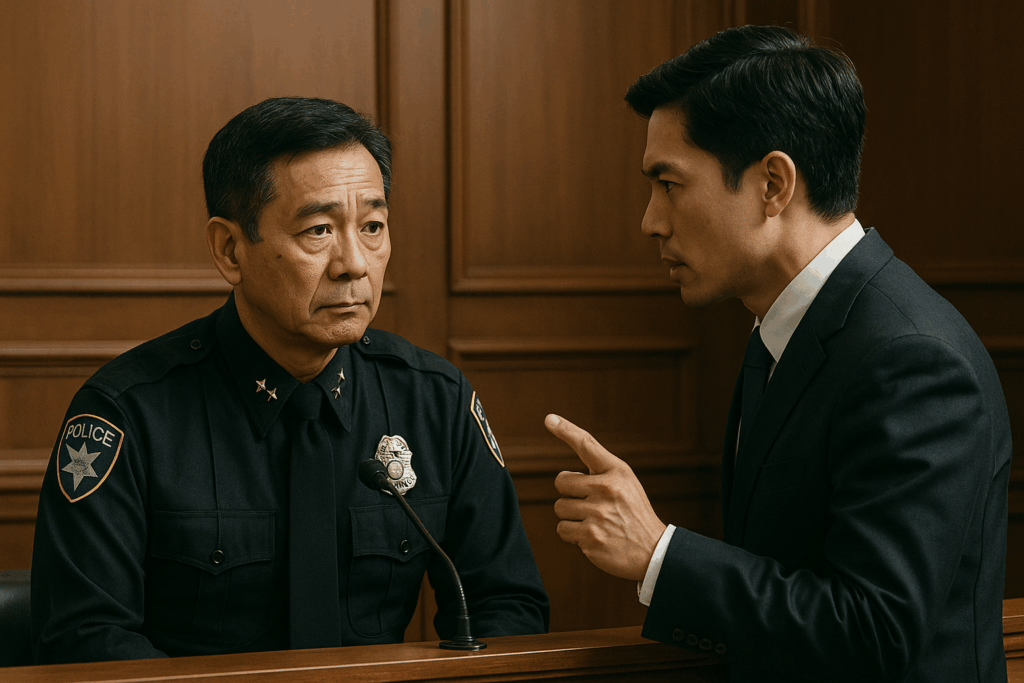Top 8 Legal Strategies Against Police Investigators in Criminal Trials

Police investigations form the bedrock of most criminal prosecutions. But what happens when the investigation itself is flawed, biased, or incomplete? For defendants and their legal teams, exposing these weaknesses is crucial. A well-prepared defense can employ proven strategies against police investigators to raise doubts about the prosecution’s case and protect the accused’s fundamental rights.
As a lead law firm in Bangkok, we often represent clients facing high-stakes criminal trials. Through careful cross-examination and legal analysis, we aim to reveal procedural errors and investigative oversights that undermine the prosecution’s credibility.
📌 Table of Contents
-
Incomplete Evidence Collection
-
Failure to Interview Defense Witnesses
-
Use of Illegal Interrogation Techniques
-
Violations of Due Process
-
Superficial or Biased Interrogations
-
Errors in Official Police Documents
-
Contradictions Between Statements and Testimony
-
Signs of Improper Influence on Investigators
1. Incomplete Evidence Collection
Many flawed prosecutions begin with inadequate evidence gathering. When police fail to secure forensic data such as fingerprints, DNA samples, or security camera footage, the defense has strong grounds to challenge the reliability of the case.
Real-World Impact:
-
Missing CCTV footage: Suggests selective evidence retention
-
Neglected forensic tests: Weakens the link between the accused and the crime scene
-
Ignored digital evidence: Such as deleted chat logs or GPS history
According to the United Nations’ Minnesota Protocol on the Investigation of Potentially Unlawful Death (source), investigators must pursue all reasonable leads, especially when evidence is requested by the defense.
2. Failure to Interview Defense Witnesses
Thai criminal law (Criminal Procedure Code, Sections 131–134) requires that police consider all relevant witnesses, not just those supporting the prosecution. Ignoring defense-nominated witnesses without valid justification may indicate bias or negligence.
Defense Strategy:
-
Ask investigators why certain witnesses were excluded
-
Highlight the absence of neutrality in the investigative process
-
Suggest selective fact-finding designed to reinforce a single narrative
Such omissions go against international fair trial standards and help the defense cast doubt on the investigator’s objectivity.
3. Use of Illegal Interrogation Techniques
One of the most effective strategies against police investigators is proving that a confession or statement was obtained through coercion. Any evidence acquired through torture, intimidation, or trickery violates both Thai and international law and can be ruled inadmissible.
Red Flags in Interrogation:
-
Long, overnight questioning sessions
-
Denial of food, sleep, or legal counsel
-
Threats or psychological pressure
-
Interrogation of minors without legal safeguards
These tactics contravene Article 15 of the Convention Against Torture (source) and can result in the exclusion of evidence.
4. Violations of Due Process
A lead law firm in Bangkok will always examine whether law enforcement respected basic procedural rights during arrest and detention.
Common Violations:
-
Failing to notify the suspect of their legal rights
-
Blocking access to a lawyer during questioning
-
Questioning juveniles without a multidisciplinary team present
-
Illegal search and seizure
These breaches undermine the legitimacy of the investigation and may constitute grounds for dismissal or suppression of evidence.
5. Superficial or Biased Interrogations
Not all misconduct is overt. Sometimes, police conduct a shallow or selectively focused investigation, asking surface-level questions and avoiding facts that contradict their theory.
Indicators:
-
Witnesses interviewed once and not followed up
-
Inconsistencies never clarified
-
Important leads ignored
Such investigative shortcuts reflect either negligence or intentional bias, weakening the overall prosecution case.
6. Errors in Police Documents and Records
When reviewing the prosecution’s file, look closely at the accuracy and internal consistency of police-generated documents.
Typical Errors:
-
Crime scene photos with incorrect time stamps
-
Mismatched or altered suspect identification forms
-
Inaccurate diagrams or reports
According to the Royal Thai Police Regulations (e.g. Articles 265–268), documentation must meet high standards of clarity and accuracy. Discrepancies can justify a reduction in evidentiary weight.
7. Contradictions Between Initial Statements and Testimony
Police investigators may be called to confirm or clarify inconsistencies between witness statements taken during the investigation and later court testimony.
Example Cross-Examination Questions:
-
“Did the witness originally state X in the police record?”
-
“Are you aware their testimony in court now contradicts that?”
-
“Why was this not followed up in the investigation?”
Highlighting these contradictions helps show that the prosecution’s case lacks consistency and reliability.
8. Influence or Pressure on Investigators
Perhaps the most damaging accusation against law enforcement is external interference. Though difficult to prove, even raising the possibility of political or social pressure can cast doubt on the investigator’s neutrality.
Supporting Evidence Might Include:
-
Investigator’s social or political ties to the complainant
-
Unusual urgency or selective interest in the case
-
Discrepancies suggesting evidence tampering or suppression
In jurisdictions that value judicial independence and impartiality, these questions must be pursued delicately but assertively.
🔎 Final Thoughts: Exposing Investigative Flaws Through Legal Strategy
The police investigator is often seen as a neutral fact-finder—but in practice, this is not always the case. When investigators cut corners, ignore key witnesses, or are swayed by pressure, it undermines the rule of law and endangers the rights of the accused.
A skilled criminal defense lawyer will use strategies against police investigators not to attack individuals, but to protect the fairness and integrity of the legal process. If you or someone you know is facing charges in Thailand, especially where investigative conduct is questionable, consult a lead law firm in Bangkok with experience in complex criminal litigation.
📚 External References:
Contact Information
Siam Center Law Group
Website: https://www.siamcenterlawgroup.com
Phone: Available for consultation 5 working days a week
For support with preparing pleadings, submitting court documents, or exploring expedited dispute resolution, our attorneys are ready to assist you with professionalism and clarity.
